中考英语重点句法考点:感叹句和反意疑问句
感叹句、祈使句、倒装句、反义疑问句考点复习
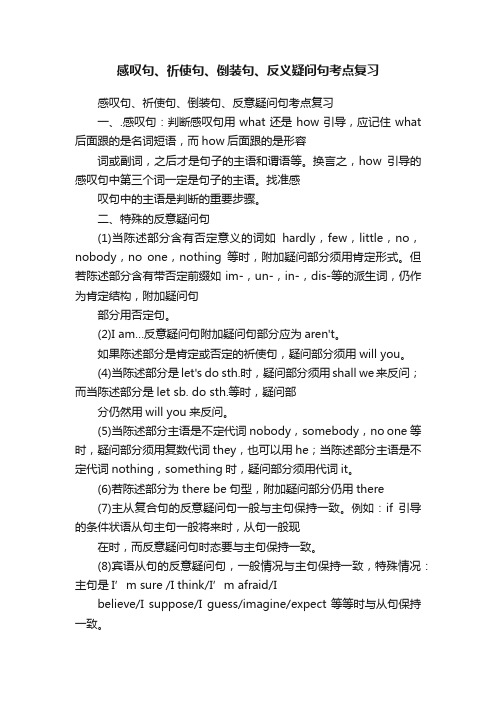
感叹句、祈使句、倒装句、反义疑问句考点复习感叹句、祈使句、倒装句、反意疑问句考点复习一、.感叹句:判断感叹句用what还是how引导,应记住what 后面跟的是名词短语,而how后面跟的是形容词或副词,之后才是句子的主语和谓语等。
换言之,how引导的感叹句中第三个词一定是句子的主语。
找准感叹句中的主语是判断的重要步骤。
二、特殊的反意疑问句(1)当陈述部分含有否定意义的词如hardly,few,little,no,nobody,no one,nothing等时,附加疑问部分须用肯定形式。
但若陈述部分含有带否定前缀如im-,un-,in-,dis-等的派生词,仍作为肯定结构,附加疑问句部分用否定句。
(2)I am…反意疑问句附加疑问句部分应为aren't。
如果陈述部分是肯定或否定的祈使句,疑问部分须用will you。
(4)当陈述部分是let's do sth.时,疑问部分须用shall we来反问;而当陈述部分是let sb. do sth.等时,疑问部分仍然用will you来反问。
(5)当陈述部分主语是不定代词nobody,somebody,no one等时,疑问部分须用复数代词they,也可以用he;当陈述部分主语是不定代词nothing,something时,疑问部分须用代词it。
(6)若陈述部分为there be句型,附加疑问部分仍用there(7)主从复合句的反意疑问句一般与主句保持一致。
例如:if引导的条件状语从句主句一般将来时,从句一般现在时,而反意疑问句时态要与主句保持一致。
(8)宾语从句的反意疑问句,一般情况与主句保持一致,特殊情况:主句是I’m sure /I think/I’m afraid/Ibelieve/I suppose/I guess/imagine/expect等等时与从句保持一致。
通用版2019中考英语二轮复习感叹句和反义疑问句讲义
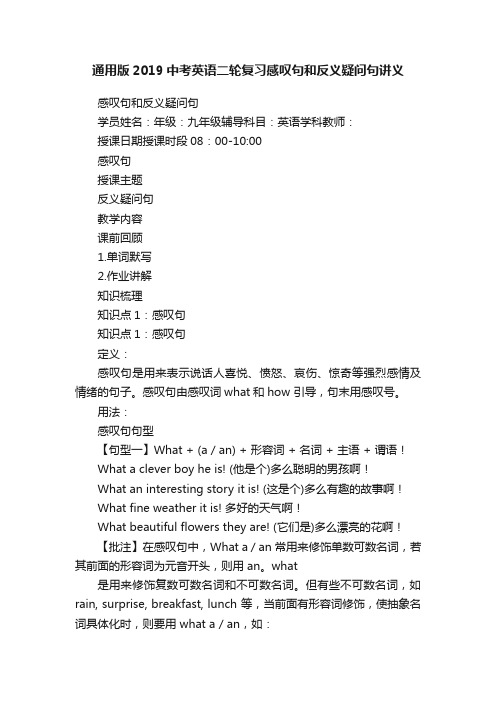
通用版2019中考英语二轮复习感叹句和反义疑问句讲义感叹句和反义疑问句学员姓名:年级:九年级辅导科目:英语学科教师:授课日期授课时段08:00-10:00感叹句授课主题反义疑问句教学内容课前回顾1.单词默写2.作业讲解知识梳理知识点1:感叹句知识点1:感叹句定义:感叹句是用来表示说话人喜悦、愤怒、哀伤、惊奇等强烈感情及情绪的句子。
感叹句由感叹词what和how 引导,句末用感叹号。
用法:感叹句句型【句型一】What + (a / an) + 形容词 + 名词 + 主语 + 谓语!What a clever boy he is! (他是个)多么聪明的男孩啊!What an interesting story it is! (这是个)多么有趣的故事啊!What fine weather it is! 多好的天气啊!What beautiful flowers they are! (它们是)多么漂亮的花啊!【批注】在感叹句中,What a / an 常用来修饰单数可数名词,若其前面的形容词为元音开头,则用 an。
what是用来修饰复数可数名词和不可数名词。
但有些不可数名词,如rain, surprise, breakfast, lunch 等,当前面有形容词修饰,使抽象名词具体化时,则要用 what a / an,如:What a heavy rain it is! 多大的一场雨啊!What a great surprise it is! 这多么令人惊奇啊!What a rich breakfast it is! 多么丰盛的一顿早餐啊!【句型二】How + 形容词 / 副词 + 主语 + 谓语!How well you look! 你气色真好!How kind you are! 你心肠真好!How beautifully you sing! 你唱得真好听!Strawberries! How nice! 草莓! 多好呀!How clever the boy is! 这个男孩多么聪明啊!How fast he runs! 他跑得多么快啊!注意(1)要修饰名词的形容词不能是表数量的many, much, little,few,遇此情况要用how,即使它们后面跟有名词:How many books he has!他的书真多!How much money he gave her!他给了她好多钱呀!How little money I have!我的钱多么少呀!How few friends he has!他的朋友真少!比较:What a little box it is!多小巧的盒子呀!(该little不表示数量)(2)有时句中的主语和谓语可以省略:How fast!多快呀!How nice!多好呀!How beautiful!多美呀!How nice of you to come!你来了真好!(3)常见的不可数名词有news, work, weather, homework, information, advice, experience经验,fun趣事,progress;但有些不可数名词前面有形容词修饰,使抽象名词具体化,则在形容词前加a/an,如rain, surprise, breakfast, lunch…例如:What a great surprise it is!What a heavy rain it is!感叹句巧解法一找·二断·三辨·四确定:“一找”即先找出句中的主语。
中考英语语法--反意疑问句、感叹句

语法专项------反意疑问句、感叹句一.反意疑问句由“陈述句+ 附加疑问句”两部分构成。
一般有两种形式:前肯后否或前否后肯。
对附加疑问部分应注意以下几点:1)主语只能用人称代词;2)附加疑问句的not必须与(be /助/情)缩写;3)附加疑问句的时态必须与陈述部分的时态一致。
eg.1)Tom is a work, isn’t Tom?(找错)_______ 2)You can swim, can not you?(找错)______ 3)He had lunch, does n’t he?(找错)________特别注意:1. 陈述部分含否定意味的词(few, little, never, nothing, nobody, no, hardly, none),附加疑问句应使用肯定形式(但前缀词unhappy, unlike, disappear等列外)eg. They are unhappy, aren’t they?2.陈述部分的主语是everything, something, nothing, anything时,其疑问句主语应用it;陈述部分主语是everybody, somebody, nobody, everyone, no one时,其疑问句主语应用they/he。
eg.1)Everything is ready, ___________? 2)Everyone is here, ____________?3.陈述部分是祈使句时,附加疑问句一般用:will you? 但注意:Let’s … , shall we?Let us … , will you?4.陈述部分含must时,附加疑问句一般用needn’t.eg. I must finish my work now, _________?5.陈述部分是there be结构时,应用there be结构来完成。
eg. There’s little water, ___________*6.陈述部分含宾语从句时,疑问部分通常与主句一致。
专题03:感叹句与反意疑问句 九年级英语上学期期中考点(人教版)

语法例题
—Somebody broke into (闯入) the store, ________?(反意疑问 句) —Yes. Let’s call the police right now.
【答案】didn’t he 【详解】句意:——有人闯进了商店,不是吗?——是的。让 我们马上给警察打电话。此处是反意疑问句,陈述部分是肯定 形式,疑问部分用否定形式,谓语broke是实义动词break的过 去式,因此否定助动词为didn’t,somebody用代词he代指, 故填didn’t he。
语法详解
(3)当must用来表示对现 在的情况进行推测时,问句通常要根据 must后面的动词采用相应的形式。 He must be good at English, isn’t he? 他英语一定学得很好,是吗? She must be a good English teacher, isn’t she? 她一定是位优秀的英语老师,是吗?
语法例题
You need some help, ________ you? A.don’t B.needn’t C.do D.need
【答案】A 【详解】句意:你需要一些帮助,不是吗? 考查反意疑问句。由题干可知,本句考查反意疑问句,反意疑 问句遵循“前肯后否、前否后肯”原则。原句时态是一般现在 时,“need”在这里是实义动词,且陈述句部分是肯定,因此 反意疑问句用否定形式don’t you,故选A。
语法详解
特殊句式(否定意义的词):反意疑问句的陈述部分带有little, few, never, hardly, seldom,以及no-短语 (no, no one,nobody,nothing)等否定意义的词时,问句部分用肯定式。
语法例题
感叹句和反义疑问句

二、陈述句变为感叹句的方法
把一个陈述句变为感叹句时,常使用“一分 二加三换位四去掉”的方法。具体步骤为: 第一步:“一分”,即在谓语动词后面划一 双竖线,使句子分为两部分。如: He is ‖ a very honest boy.他是一个诚实的 孩子。 Li Lei works‖ very hard.李雷学习很刻苦。
4. My farther always works very hard . How hard my father works!
5. Sally has a sweet voice .
What a sweet voice Sally has!
课堂检测: 一、用How , What (a / an) 填空 1. ________ delicious food it is ! What 2. ________interesting film! What an 3. _________bad weather ! What What a 4. _________good day ! 5. How ________tall the boy is ! What 6. _________good news it is ! 7. What _________beautiful clothes they are ! What a 8. _________ nice teacher he is ! 9. How _________nice Tom is ! What 10._________ hard work ! What a 11. _________ hard job !
反意疑问句:由陈述句+简短问句构成。 简短问句由助动词 / be动词 / 情态动词 + 人称 代词构成。主要考点: 1、前肯后否,前否后肯的原则。即当陈述句为 肯定句时,简短问句为否定形式。当陈述句为 否定句时,简短问句为肯定形式。 2、句中含有no , never , hardly , few , little , nothing , nobody , seldom 等否定意义的词 时,后面用肯定形式。 如:There is little water in the bottle , is there? He can hardly speak English , can he ? 3、简短问句部分的主语应用人称代词。
中考英语反义疑问句、感叹句讲解及习题
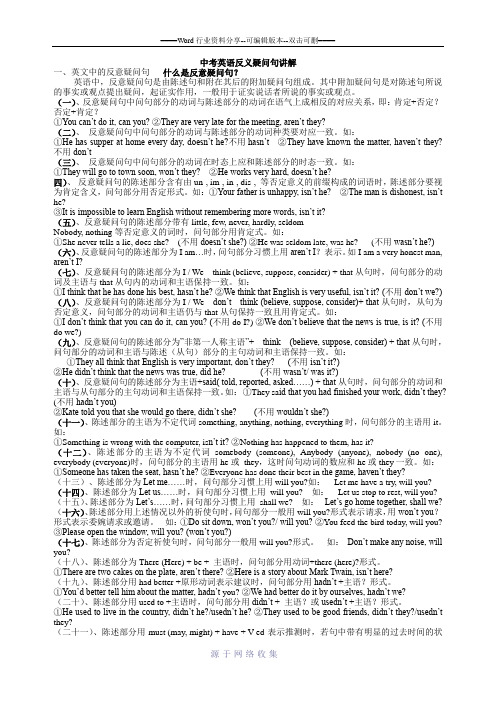
中考英语反义疑问句讲解一、英文中的反意疑问句什么是反意疑问句?英语中,反意疑问句是由陈述句和附在其后的附加疑问句组成。
其中附加疑问句是对陈述句所说的事实或观点提出疑问,起证实作用,一般用于证实说话者所说的事实或观点。
(一)、反意疑问句中问句部分的动词与陈述部分的动词在语气上成相反的对应关系,即:肯定+否定?否定+肯定?①You can’t do it, can you? ②They are very late for the meeting, aren’t they?(二)、反意疑问句中问句部分的动词与陈述部分的动词种类要对应一致。
如:①He has supper at home every day, doesn’t he?不用hasn’t②They have known the matter, haven’t they?不用don’t(三)、反意疑问句中问句部分的动词在时态上应和陈述部分的时态一致。
如:①They will go to town soon, won’t they? ②He works very hard, doesn’t he?四)、反意疑问句的陈述部分含有由un-, im-, in-, dis-, 等否定意义的前缀构成的词语时,陈述部分要视为肯定含义,问句部分用否定形式。
如:①Your father is unhappy, isn’t he? ②The man is dishonest, isn’t he?③It is impossible to learn English without remembering more words, isn’t it?(五)、反意疑问句的陈述部分带有little, few, never, hardly, seldomNobody, nothing等否定意义的词时,问句部分用肯定式。
如:①She never tells a lie, does she? (不用doesn’t she?)②He was seldom late, was he? (不用wasn’t he?) (六)、反意疑问句的陈述部分为I am…时,问句部分习惯上用aren’t I?表示。
中考英语总复习-反义疑问句和感叹句
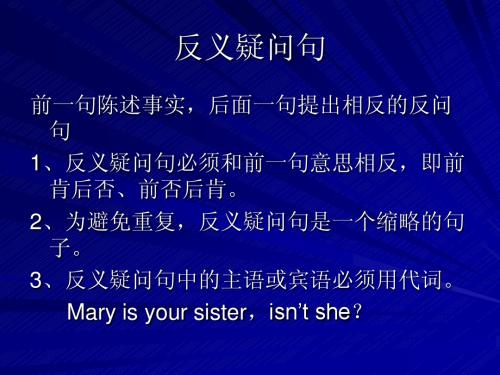
4、陈述部分是祈使句时,用will \would you或won’t you 但祈使句为Let’s后用 shall we; Let us 后用will you Open the door, will you? 5、陈述部分是感叹句,后用be的一般现在时的否定。 What a kind girl,isn’t she? 6、陈述部分的主语是从句、不定式、动词ing或复合不定代 词时,后用it。 Nothing is wrong, is it? What you want is time,isn’t it?
反义疑问句
前一句陈述事实,后面一句提出相反的反问 句 1、反义疑问句必须和前一句意思相反,即前 肯后否、前否后肯。 2、为避免重复,反义疑问句是一个缩略的句 子。 3、反义疑问句中的主语或宾语必须用代词。 Mary is your sister,isn’t she?
注意事项
1、陈述部分有含否定意义的词,如seldom,little,never等时, 看做否定,后用肯定。 He seldom smokes,does he? 但:如果否定来自词的前缀或后缀时,仍看做肯定,后用否定 He dislike the book,doesn‘t he? 2、陈述部分是there be,疑问部分用be的适当形式+there There was a girl yesterday,wasn’t there? 3、陈述部分有情态动词must + be (推测)后用be 的否定形式 Mary must be your sister,isn’t she? 但:must表必须时,后用needn’t。 I must go, needn’t I? mustn‘t 表禁止时,后用must You mustn’t smoke in the hospital, must you?
感叹句和反义疑问句

感叹句和反义疑问句:
一、感叹句:
1.作用:感叹句用于表达喜、怒、哀、惧等强烈的感情。
2.类别:主要有由感叹词how或what引导的两种。
另外,陈述句、祈使句等,甚至
一个单词或一个短语都可以通过改变语调或在句尾加感叹号!而表示强烈的感情,从而成为感叹句。
如下表:
1.作用:表示怀疑或没有把握,需要对方用Yes或No回答。
但有时是为了加强陈述
句的语气,并不要求对方回答。
2.反义疑问句是放在陈述句后面的一个简短问句,也叫“附加疑问句”,通常用逗号
与前面的句子隔开。
复合“前肯后否,前否后肯”的原则。
3.反义疑问句部分由“系动词be、助动词或情态动词+主语”构成
注意:有些反义疑问句,前面的句子形式上是肯定句,但是因为有never, hardly, no ,
few, little 等表示否定意义的词时,附加疑问部分的动词必须是肯定形式;但是,如
果陈述部分的否定词带有否定前缀的词如unsuccessful, impossible时,附加疑问部
分仍然用否定形式。
如:He looks unhappy, doesn’t he?
Maria has few friends in China, _______?
A.has she
B. doesn’t she
C. does she。
中考英语重点句法考点:感叹句和反意疑问句
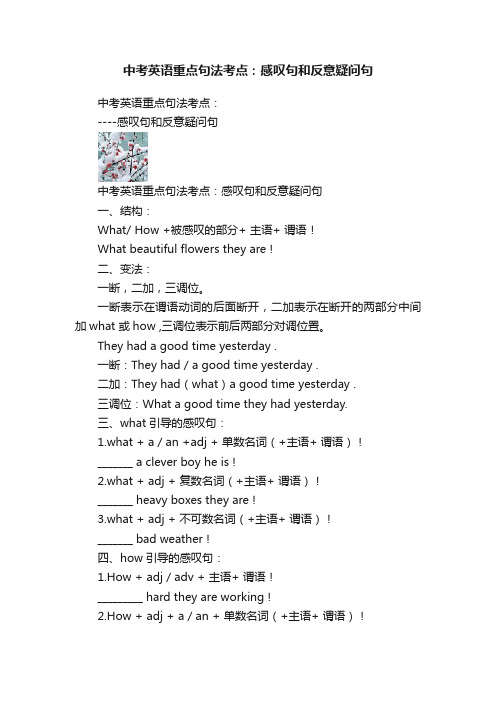
中考英语重点句法考点:感叹句和反意疑问句中考英语重点句法考点:----感叹句和反意疑问句中考英语重点句法考点:感叹句和反意疑问句一、结构:What/ How +被感叹的部分+ 主语+ 谓语!What beautiful flowers they are !二、变法:一断,二加,三调位。
一断表示在谓语动词的后面断开,二加表示在断开的两部分中间加what 或how ,三调位表示前后两部分对调位置。
They had a good time yesterday .一断:They had / a good time yesterday .二加:They had(what)a good time yesterday .三调位:What a good time they had yesterday.三、what引导的感叹句:1.what + a / an +adj + 单数名词(+主语+ 谓语)!_______ a clever boy he is !2.what + adj + 复数名词(+主语+ 谓语)!_______ heavy boxes they are !3.what + adj + 不可数名词(+主语+ 谓语)!_______ bad weather !四、how引导的感叹句:1.How + adj / adv + 主语+ 谓语!_________ hard they are working !2.How + adj + a / an + 单数名词(+主语+ 谓语)!How tall a boy he is !3.How + adj / adv + the + 名词+ 谓语!________ heavily the rain is falling!五、what 与how引导的感叹句之间的转换:1.What a beautiful girl she is !=______ beautiful the girl is !2.How delicious the food is !=______ delicious food it is !六、几个常见的感叹句:1.______ great fun it is !2.______ important information !3.______ good news !4.______ good advice / music !5.______ a heavy rain !6.______a strong wind !七、感叹句中常见的不可数名词:food , work , weather , fun , music , information , news , advice 2010中考英语重点句法考点:反意疑问句一、结构:陈述句+ 附加疑问句?It's hot today ,isn't it ?二、原则:1.前肯后否,前否后肯2.前名后代3.时态一致三、变法:一疑、二否、三连、四省、五转换(名变代)。
中考感叹句祈使句反义疑问句集锦)

中考感叹句1) what a/an;是不可数名词或可数名词复数,只用what。
2)a/an/the/my/your/this/that/Tom’s等等乱七八糟的东西,想都不用想,直接用how 就OK了。
如:例句1:What a boy he is! 他是个多么好的男孩啊!\单数名词例句2:boys they are! 他们是多么好的男孩啊!\复数名词例句3:weather it is! 多么冷的天气啊!\不可数名词例句4:the boy is! 这男孩多好啊!\乱糟糟★★★若没有形容词,而出现副词或是句子,直接用how.例:How well he plays the guitar! 他吉他弹得多好啊!/副词(what不可以修饰副词,看到副词直接用how)How time flies!How fast Liu Xiang runs( )1. ____ a nice watch it is!(1998山东)A. HowB. WhatC. What aD. How a( )2. ____ bright girls they are!(1998浙江)A. WhatB. What aC. HowD. How a( )3. ____ interesting the film is!(1998湖北)A. WhatB. What anC. HowD. How a( )4. ____ sunny day! Let’s go out f or a walk.(1999江西)A. How aB. HowC. What aD. What( )5. ____ hard work it is!(1999浙江)A. HowB. WhatC. What aD. What an( )6. ____ day it is! It’s rainy again. (1999江西)A. How badB. What a badC. How fineD. What a fine( )7. ____ great day July 1,1997 will be! (1999上海)A. How aB. What aC. HowD. What( )8. ____ expensive trousers!(1999浙江)A. WhatB. What aC. HowD. What an( )9. ____ girl she is!(1998河北)A. What bright aB. How a brightC. How bright aD. What bright( )10. ____ weather we have today!(1983上海)A. A fineB. What a fineC. How a fineD. What fine( )11. ____ careless he is!(1986吉林)A. WhatB. HowC. So muchD. How much( )12. ____ from Beijing to London!(1993黑龙江)A. How long way it isB. What a long way is itC. How long way is itD. What a long way it is ( )13. Oh, John, ____ you gave us!(1990内蒙古)A. How a pleasant surpriseB. How pleasant surpriseC. What a pleasant surpriseD. What pleasant surprise一选择题1 _________clever girl she is!A What aB WhatC How aD H ow2 __________interesting story it is!A What anB What aC How anD How3 _______ children they are!A WhatB What aC How aD How4 ____________flowers they are!A What beautifulB What a beautifulC How beautifulD How a beautiful5 ___________ it is today!A How coldB What coldC How a coldD What a cold6 _______bad the weather is!A HowB WhatC What aD How a7 _____go news it is !A HowB What aC How aD What8 ______the sunshine is!A What a brightB How a brightC How brightD what bright9 _____ he writes.A How goodB How wellC What goodD What well10 _____ LiLei runs!A What fast boyB What fastC How fastD How a fast11_____ hard he works!A HowB What C.How a D. What a12 Which is true?A How tall the buildings are!B What tall the buildings are!C How tall buildings they are!D what a tall buildings they are!13 _______ it is raining!A How heavilyB What heavyC How heavy14 ____ delicious the dish is!A. WhatB. HowC. What a15 ____ strange clothes he is wearing!A. What aB. WhatC. How a16 ____ interesting subject it is!A. What anB. HowC. What17 ____ foggy it was yesterday!A. WhatB. What aC. How18____ careless a boy you are!A. HowB. What aC. What19 _________ wonderful time we have had.A.HowB.How aC.WhatD.What a20. Listen !____wonderful music it is! I really enjoy it very much.A.WhatB.What aC.HowD.How a21.______wonderful music it is! I like Beethoven’s better than anybody else’s.A.WhatB.How aC.WhatD.How22._______weather! I really enjoy it very much.A.How fineB.How fine aC.What a fineD.What fine23._____fun it is to play computer games when we’re free.A.What aB.WhatC.How aD.How24._____warm weather it is today! Let’s go climbing.A. What aB.HowC.How aD.What25.----- I hear that an old couple are traveling around China by bike.------Oh, ____long way on their bicycles ! they are so great.A. What aB.HowC.How aD.What26. It’s reported that the 29th Olympic torch is going to travel to 135 cities around the world. _____exciting the news is! And it’ll arrive at the opening ceremony on August 8th, 2008.A. What aB.HowC.How aD.What27______kind girl Nancy is!Yes. She is always ready to help others.A.WhatB.How aC.What aD.How28. Let’s go out for doing sports. ______sunny day!A.WhatB.How aC.What aD.How29. ______exci ting news! We’ve never had _____long vacation before.A.What;such aB.How; such aC.What an;such a D what; so a30.______important English speech contest they are listening to!A.WhatB.How aC.What anD.How an31____it was yesterday because of the storm!A.What bad weatherB.What a bad weatherC.How bad a weatherD.How bad weather32._____tall the boy is!he can play volleyball very well.A.WhatB.How aC.What aD.How答案:1-5 AAAAA 6-10 ADCBC 11-15 AAABB 16-20 ACCDA 21-25ADBDA26-32 BCCAC AD祈使句1. It’s an important meeting. __________ (not, be )late.2. ____________ (not,make) any nise! Your mother is sleeping.3. ____________ (not, speak) with your mouth full of food and ____________ (be) polite.4. ____________ ( not, talk) and ____________ (read) aloud.5. ____________ (not,leave) your homework for tomorrow, Larry.6. ____________ (look) out! A car is coming.7. ____________ (give) us ten years and just see what our country will be like.8. ____________ (not, let) the baby cry.9. Wear more clothes or you ____________ (catch) a cold.10. Let’s ____________ (not, say) anything about it.II. 选择填空( )1 .Her doctor said: “________ work so hard”A StopB Don’tC Can’tD No( )2. Sindy, ________ to be here at 8 o’clockA is sureB is sure thatC will be sureD be sure( )3.________ when you cross the road.A Do careB CareC Do be carefulD To be careful( )4. ________him the secret, will you?A Don’t tellB Not to tellC Not tellingD No telling( )5. ________ in bed. It’s bad for your eyes.A Not to readB Don’t readC Don’t to readD Not read( )6. ________ Your child. We’ll look after him.A Not to worry aboutB Don’t worry aboutC Not worry forD Don’t worry with( )7.They are very tired. Why ________ have a rest?A not theyB do not theyC don’t theyD not to( )8 --You look rather tired. ________ stopping to have a rest?-- All right.A Why notB How aboutC Why not to Dwhy don’t( ) 9 ______ tell a lie.A HardlyB NotC NoD Never ( )10.Please ________ look outside.Look at the blackboard.A notB don’tC aren’tD can’t( )11. Why don’t you join us in the game?A What notB Why notC Why toD How to( ) 12 ______ go for the book alone, Ms Zhang.A Let’sB Let meC LetusD Allow( )13 John, read the text for us,________?A does heB will heC do youD will you( )14. Let’s do it a t once, ________ ?A shall weB will youC do weD do you( )15. Let us do it at once, ________ ?A shall weB will youC do weD do you中考反义疑问句1. I don't think that the necklace is made of diamond, ________?A. do IB. do youC. isn't itD. is it2. His wife had the carpets and the curtains cleaned, ________?A. hadn'tB. hadC. didn't sheD. did she3.It's my son's wedding next week, and I have to do my best for that,_______ ?A. haven't IB. don't IC. don't heD. isn't it4.Harry wouldn't become a teacher if it hadn't been for the holiday, ______ ?A. would heB. had itC. would itD. had he5. No one left here yesterday,________?A. didn't theyB. did theyC. didn't oneD. did one6. Birds rarely build nests in our garden,________?A. don't theyB. do theyC. didn't theyD. did they7. You must have been to the Great Wall,____________?A. mustn't youB. haven't youC. aren't youD. must you8. learning how to repair motors takes a long time,________?A. doesn't itB. don't theyC. does itD. do they9.They must have stayed at home last night,________?A. mustn't theyB. haven't theyC. didn't theyD. must they10.I feel like going to the cinema tonight,________?A. don't IB. don't youC. do ID. do you11.Let's start out early tomorrow morning,________?A. shall weB. will youC. do youD. can't you12.There's not much news in today's newspaper,________?A. isn't itB. is itC. isn't thereD. is there13.They need our help badly at the moment,________?A. needn't theyB. need theyC. don't theyD. do they14.She is unfit for the position,________?A. is sheB. isn't sheC. doesn't sheD. does she15.I wish to visit America,________?A. don't IB. can IC. may ID. may you16.She's been a worker here for many years,________?A. isn't sheB. is sheC. hasn't sheD. has she17.What beautiful flowers,________?A. aren't theyB. are theyC. isn't itD. is it18.Mother used to live in a poor village,____________?A. used sheB. usedn't sheC. didn't heD. did he19.You'd better go at once,________?A. wouldn't youB. had youC. hadn't youD. should you20.I am very interested in Mark Twain's novels,________?A. aren't IB. am not IC. aren't youD. are youKeys:1-5 DCBAB6-10 BBACD11-15 ADABC16-20 CABCA1. You’d rather watch TV this evening, ______?a. isn’t itb. hadn’t youc. wouldn’t youd. won’t you2. I suppose you’re not going today, ______?a. are youb. do youc. don’t youd. aren’t you3. I wish to shake hands with you, ______?a. shallb. may Ic. do Id. will I4. Three hours ought to be enough time, ______?a. oughtn’t three hoursb. didn’t theyc. shouldn’t itd. shouldn’t three hours5. They have to study a lot, ______?a. don’t theyb. haven’t theyc. did theyd. hadn’t they6. When the car crashed, your brother escaped being hurt, ______ ?a. didn’t heb. did hec. did itd. didn’t it7. I'm sure dirty, ______?a. am Ib. isn’t Ic. aren’t Id. am not I8. You seem to be dissatisfied with your present post. I don’t think you judged your ability objectively when you applied for it, ______ you?a. dob. didc. don’td. didn’t9. That’s the sort of the book you want, ______?a. is it d. isn’t that c. is that d. isn’t it10. All these dictionaries are a great help to you, ______?a. are theyb. aren’t theyc. are all these dictionariesd. aren’t all these dictionaries11.The movie that we saw last week was quite interesting, ______?a. wasn’t itb. was itc. didn’t wed. weren’t we12.Tom has been writing letters all afternoon, but he should have finished them by now, ______?a. hasn’t heb. has hec. shouldn’t hed. didn’t you13.David told me that you would take a trip to America, ______?a. would youb. wouldn’t youc. did youd. didn’t you14.There appeared to be no better way, _______?a. was thereb. were therec. did thered. didn’t there15. You has some trouble finding where I live, ______?a. didn’t youb. hadn’t youc. do Id. don’t I16.He has his hair cut every month, ______?a. has heb. hasn’t hec. does hed. doesn’t he17.Your friend needs to come earlier, ______?a. does heb. doesn’t hec. need hed. needn’t he18.The little boy dare not go to church, ______?a. dare heb. daren’t hec. does hed. doesn’t he19. Susan’d have worked abroad if she’d had the chance, ______?a. has sheb. hadn’t shec. would shed. wouldn’t she20. Everyone’s having a good time, ______?a. is heb. isn’t everyonec. does hed. aren’t they21.Any one can join the club, ______?a. can any oneb. can’t any onec. can’t theyd. can they22.Tell me how to operate the electronic computer, ______?a. will youb. sha n’t youc. do youd. don’t you23.Magaret scarcely comes to visit you on Christmas Day, ______?a. doesn’t sheb. does shec. do youd. don’t you24. Let’s listen to the radio program that the teacher mentioned, ______?a. do web. don’t wec. shall wed. shan’t we25.You think you’re funny, ______?a. didn’t youb. are youc. don’t youd. do you26.Janet used to take part in labor in that village, ______?a. used sheb. did shec. didn’t shed. should she27.What beautiful weather, ______?a. is itb. isn’t itc. won’t itd. doesn’t it28. He ought to go toKwangchow by plane, ______?a. should heb. shouldn’t hec. would hed. wouldn’t he29. We never dared to ask him a question, ______?a. did web. didn’t wec. dared wed. daren’t we30. Nobody will believe how difficult his work has been ______?a. will heb. won’t nobodyc. will theyd. won’t they31.You must have made the mistake, ______?a. mustn’t youb. haven’t youc. didn’t youd. hadn’t you32.Learning how to repair computers takes a long time, ______?a. isn’t itb. aren’t theyc. doesn’t itd. don’t they33.Jack has coffee with breakfast, ______?a. hasn’t Jackb. hasn’t hec. doesn’t Jackd. doesn’t he34.They must have stayed at hotel last night, ______?a. mustn’t theyb. haven’t theyc. didn’t theyd. hadn’t they35.There isn’t anything wrong with the radio, ______?a. is thereb. is itc. does itd. does there36.You must be hungry, ______?a. must youb. mustn’t youc. are youd. aren’t you37.Let’s do the exercises by ourselves, ______?a. shall web. shan’t wec. will youd. will we38.Her daughter had the carpets and curtains cleaned, ______?a. had sheb. hadn’t shec. didn’t shed. didn’t her daughter39.The teacher had a talk with you, ______?a. has youb. hadn’t shec. did shed. didn’t she40.Something’ll have to be done about the air pollution, ______?a. won’t itb. will itc. has itd. does it41. Linda ate nothing this morning, ___?A. didn’t sheB. was sheC. did sheD. wasn’t she42. There’s hardly___ milk in the bottle, _____there?A. no, isn’tB. some, isC. little, isn’tD. any, is43. He has never ridden a horse before, ___?A. does heB. has heC. hasn’t heD. doesn’t he44. — He seldom came here, _____? — Yes sir.A. didn’t heB. does heC. doesn’t heD. did he45. Everything seems all right, _____ ?A. does itB. don’t theyC. won’t itD. doesn’t it46. Nobody was absent from the meeting, ____ ?A. was itB. were theyC. wasn’t heD. weren’t they47. One can’t be too modest, can _____ ? A. one B. he C. it D. we48. No one failed in the exam, _____ ? A. was he B. did one C. did they D. didn’t he 9. I’m a little late for class, _____ I? A. amn’t B. am not C. isn’t D. ain’t50. Neither you nor I am a artist, _____ ? A. am I B. aren’t we C. are we D. ain’t I51. He can’t be her father, _____ he? A. is B. isn’t C. can D. can’t反意疑问句练习答案1 C2 A3 B4 C5 A6 A7 C8 B9 D 10 B 11 A 12 C 13 B 14 D 15 A 16 D 17 B 18 A 19 D 20 D21 C 22 A 23 B24 C25 D26 C 27 B28 B 29 A 30 C 31 B 32 C33 D34 C35 A36 D37 A 38 C39 D 40 A41 C 42 D 43 B 44 D 45 D 46 B 47 A 48 C 49 D 50 C 51 A友情提示:范文可能无法思考和涵盖全面,供参考!最好找专业人士起草或审核后使用,感谢您的下载!。
中考英语语法--祈使句、感叹句、反义疑问句、it、倒装句

其他it作形式主语
It作形式宾语
• it用作形式宾语的句型为:主语+谓语+it +宾语补足语+动词不定式/动名词/从 句。该句型中宾语补足语可由形容词、名 词等充当。
•
--- Don‟t go out, please. It‟s raining heavily outside. • 请不要出去。外面雨下得很大。 • ---- Yes, I will. I have to meet my brother at the airport. • 不行,我得去机场接我弟弟。
8,陈述部分有have to +v.原 (had to + v.原),
疑问部分常用don„t +主语(didn‟t +主语)。
We have to get there at eight, don't we? 9,陈述部分若为主从复合句,疑问部分的主 语通常与主句的主语一致。 She said he would come tomorrow, didn‟t she? He told us how to get to the farm, didn‟t he?
祈使句的否定句式
祈使句的பைடு நூலகம்答
• 祈使句的动作通常是表示将来发生的动作, 所以回答祈使句时,一般用will或won‟t。 在回答具有否定意义的祈使句时,要注意 两点:一是形式一致,即Yes与will保持一 致;No与won‟t保持一致。二是意思相反, 即Yes是不的意思;No是“是”的意思。 在回答时,要注意分析上下文语境中所提 供的条件。
前肯后否 前否后肯
• Jim is doing his homework, isn‟t he? • Tom wasn‟t watching TV at 8 yesterday, was he? • You went to Beijing yesterday, didn‟t he? • You knew nothing about him, did you? • There is little water in the cup, is there? • There are a few apples in the bag, aren‟t there?
感叹句、选择疑问句和反意疑问句

感叹句、选择疑问句和反意疑问句一、感叹句1、如果想表达一种较为强烈的感情,可以用感叹句2、It’s so beautiful!I love his music!这种感叹句在句式上与陈述句没有任何区别,只是将句号变成了感叹号,语气变得更强烈。
3、英文中有一种专门表达感叹的句式,即what引导的感叹句其结构为(1)what+a/an+形容词+可数名词(单数)+主语+谓语(主谓可省)what a nice girl (she is)!(2) what+形容词+可数名词复数/不可数名词+主语+谓语What beautiful flowers they are!What delicious food!二、选择疑问句在问题中提供两个或两个以上可选答案的问句叫做选择疑问句。
Is it by the father or the son?Should I call or email you?Did you come here by bus or by car?or所连接的内容前后必须一致,要么都是名词,要么都是动词,要么都是介词短语。
三、反意疑问句反意疑问句附在陈述句之后,对陈述句所叙述的事实提出相反的疑问。
也需要用yes 或no来回答。
但有时,说话人用反意疑问句加以反问,目的在于加强陈述句的语气,并不要求对方回答。
陈述句如果是肯定结构,反意疑问句一般用否定结构;而陈述句如果是否定结构,反意疑问句一般用肯定结构。
反意疑问句的结构:谓语+主语John and Tom are playing football, aren’t they?It is a good film, isn’t it?They will not come, will they?THANKS致力为企业和个人提供合同协议,策划案计划书,学习课件等等打造全网一站式需求欢迎您的下载,资料仅供参考。
初三英语专题语法---感叹句&反义疑问句
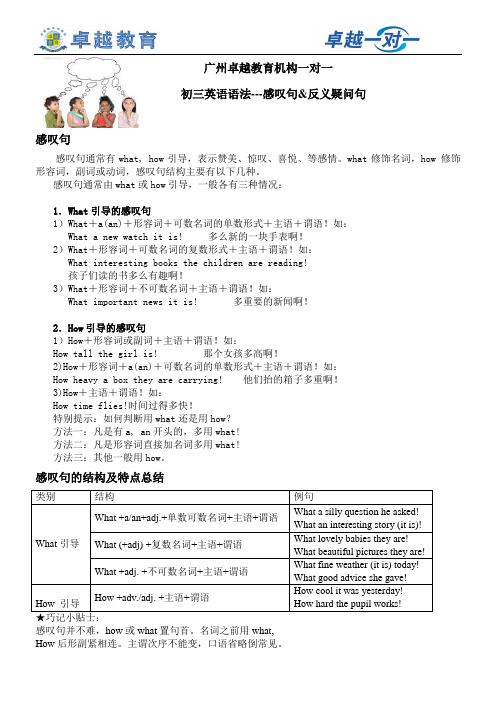
广州卓越教育机构一对一初三英语语法---感叹句&反义疑问句感叹句感叹句通常有what, how引导,表示赞美、惊叹、喜悦、等感情。
what修饰名词,how 修饰形容词,副词或动词,感叹句结构主要有以下几种。
感叹句通常由what或how引导,一般各有三种情况:1.What引导的感叹句1)What+a(an)+形容词+可数名词的单数形式+主语+谓语!如:What a new watch it is! 多么新的一块手表啊!2)What+形容词+可数名词的复数形式+主语+谓语!如:What interesting books the children are reading!孩子们读的书多么有趣啊!3)What+形容词+不可数名词+主语+谓语!如:What important news it is! 多重要的新闻啊!2.How引导的感叹句1)How+形容词或副词+主语+谓语!如:How tall the girl is! 那个女孩多高啊!2)How+形容词+a(an)+可数名词的单数形式+主语+谓语!如:How heavy a box they are carrying! 他们抬的箱子多重啊!3)How+主语+谓语!如:How time flies!时间过得多快!特别提示:如何判断用what还是用how?方法一:凡是有a, an开头的,多用what!方法二:凡是形容词直接加名词多用what!方法三:其他一般用how。
感叹句的结构及特点总结感叹句并不难,how或what置句首。
名词之前用what,How后形副紧相连。
主谓次序不能变,口语省略倒常见。
二、把陈述句改为感叹句口诀陈改感叹并不难:What或How置句前,形、副紧跟how后,what(冠)要和形名连,主语谓语在句末,它们省略也常见。
三、感叹句解题四部曲(1)找谓语:先找谓语后定主语。
感叹句谓语动词或系动词位于句末,如果找不到就是省略了。
如:what a brave boy he is! How hard she studied!(2) 找主语:谓语动词前的名词或代词就是句子的主语,找到主语后,在主语前划线,把它与前面分离。
中考英语感叹句和反意疑问句复习资

xx英语感叹句和反意疑问句复习资料感叹句通常由what,how引导,表示赞美、惊叹、喜悦、等感情。
what修饰名词,how修饰形容词,副词或动词,感叹句结构主要有1、How+形容词+a/an+名词+主语+谓语Howcleveraboyheis!2、How+形容词或副词+主语+谓语Howlovelythebabyis!3、What+a/an+形容词+名词+主语+谓语Whatacleverboyheis!4、What+形容词+复数名词+主语+谓语Whatwonderfulideas(wehave)!5、What+形容词+不可数名词+主语+谓语Whatnoisetheyaremaking!How还可以来感叹一个句子。
如:HowIloveyou!一、将下列句子改为感叹句1.Tom is a clever boy. →_________________!2.The wind is blowing strongly. →______________________!3.These cakes are very delicious. →______________________!4.He is a strange man. →_____________________!5.It is a pity to miss the play. →_________________________!6.These flowers are so beautiful.→_________________________!7.The room is big.→_________________________!8.It is a very interesting film.→_________________________!9.We have a good teacher.→_________________________!10.This question is very easy.→_________________________!11.The TV play is too long.→_________________________!12.The building is so tall.→_________________________!13.Lucy’s handwriting is very beautiful.→_________________________!14.My dog is very smart.→_________________________!15.The boys are playing happily.→_________________________!二.选用what, what a(an), how, how a(an)填空1. Look! _______fast the boy is running!2. _______cold day it was yesterday!3. _______heavy the box is! I can’t carry it.4. _______interesting story he told us!5. _______nice the mooncakes are!6. _______bad weather!7. _______clever children all of you are!8. _______important news that is!9. _______he wishes to go to college!10. _______beautiful flowers you bought me!提高型1. ____ a nice watch it is!(1998山东) A. HowB. WhatC. What aD. How a2. ____ bright girls they are!(1998浙江) A. WhatB. What aC. HowD. how a3. ____ interesting the film is!(1998湖北) A. WhatB. What anC. How4. ____ sunny day! Let’s go out for a walk.(1999江西) A. How aB. HowC. What aD. What5. ____ hard work it is!(1999浙江) A. HowB. WhatC. What aD. What an6. ____ day it is! It’s rainy again. (1999江西) A. How badB. What a badC. How fineD. What a fine7. ____ great day July 1,1997 will be! (1999上海) A. How aB. What aC. HowD. What8. ____ expensive trousers!(1999浙江) A. WhatB. What aC. HowD. What an综合型1.____girlsheis!(1998河北)A.WhatbrightaB.HowabrightC.HowbrightaD.Whatbright2.____weatherwehavetoday!(1983上海)A.AfineB.WhatafineC.HowafineD.Whatfine3.____carelessheis!(1986吉林) A.WhatB.HowC.SomuchD.Howmuch4.____fromBeijingtoLondon!(1993黑龙江)A.HowlongwayitisB.WhatalongwayisitC.HowlongwayisitD.Whatalongwayitis5.Oh,John,____yougaveus!(1990内蒙古)6.____usefulworktheyhavedone!(2000上海)A.WhatB.HowC.WhataD.Whatan7.____nicepictureyougaveme!(2000杭州) A.HowB.WhatC.WhataD.Whatan8.It’safineday.Let’sgofishing,____?(1990北京西城区)A.won’tweB.willyouC.don’tweD.shallwe反义疑问句(TheDisjunctiveQuestion) 即附加疑问句。
中考专项反义疑问句和感叹句

反义疑问句一.构成:________________, 简短的___________?例如:Lucy is a student, isn’t she?注意①;问句部分的主语必须用代词,②问句部分的动词要和前面陈述句中的助,be,情一致如:They work hard, ________? She is hard-working,________?Tom can’t ride a bike, ___________?★二.反义疑问句要遵循的原则:前肯后否,________________.三:特殊情况:1.当陈述部分是I am…时, 疑问句部分用____________I am a student, aren’t I★2.暗含否定的词有:never,seldom, hardly,few,little,no, nothingThere are few apples in the basket,___________?He can hardly swim, ___________?They seldom come late, ___________?注意:否定前缀不能视为否定词,其反意疑问句仍用否定形式。
否定前缀都有哪些?It is impossible, isn't itHe is not unkind to his classmates, is he★3.祈使句的反义疑问句①祈使句都用_____________?②以Let’s 开头的祈使句,问句用______________?③Let us 开头的祈使句,问句用________________?例如:Let’s go out for a walk, ________?Let us go our for a walk, _________?Turn on the radio, will you? Don’t go out on school night,_________?4.不定代词做主语①主语是指人的不定代词(everybody, anyone, somebody, nobody, no one)问句中用_______或________Everyone knows the answer, don't they 或________?Nobody knows about it, do_________/(__________ he)?②主语是指物的不定代词(everything, anything, something, nothing,)用_________ Everything goes well,_________?Nothing is difficult if you put your heart into it,_________?★6、used to句型,用didn't或 usedn'tHe used to take pictures there, __________ / ___________★7.there be句型的反义疑问句,疑问句的主语用there.例:There aren’t many books on the desk,_________?There used to be a house there,________?8.带有否定前移的反义疑问句,如: I/we think, believe, 应和之后的从句一致,还要考虑否定前移。
中考复习 反义疑问句 祈使句 感叹句 (共17张PPT)

一. 感叹句 4. ___H_o_w____ interesting the dog is!
How + 形容词/副词 + 主 +谓
5. ___H_o_w____ useful a subject it is! How + 形容词 + a/an + 可数名词单数+主+谓
6. ___H_o_w_____ time flies! How + 主+ 谓
否定的祈使句句型 Don`t be late. Let`s not speak loudly.
Don`t + v Let`s + not + v
3. --- _W__h__a_t_a_ pleasant journey it is!
What a/an adj.+ n! Journey 可数名词
二. 祈使句
以动词原形开头,主语省略
Come in!
Be quiet!
有时为了加强语气,在动词前加do, 表“务必”
Do come on time!
有否定词的反义疑问句
判定找动换代
1. Bob rarely got drunk, _d__id___he?
2. She seldom goes to the cinema, __d_o_e_s_she?
陈述部分有seldom, hardly, never, rarely, few, little, nowhere, nothing, nobody, scarcely等(半)否定词时,附加疑问词用肯定形式。
Tom has a new watch, _d_o__e_s_n_`_t_/_h_a__s_n_`_t_ he ?
中考英语感叹句和反意疑问句复习资料(1)
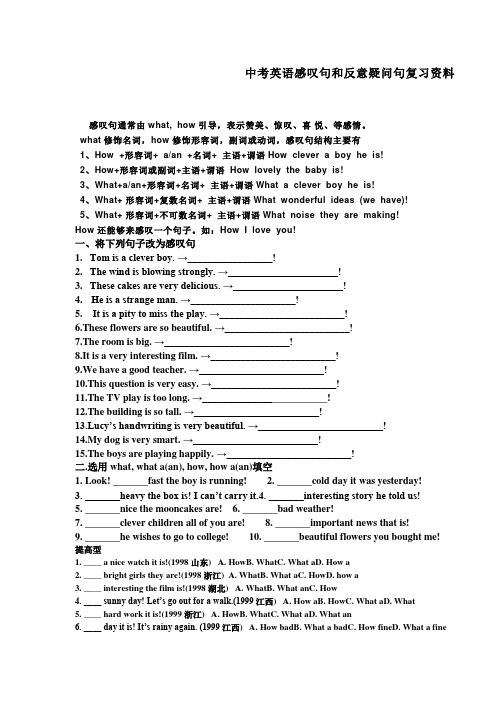
中考英语感叹句和反意疑问句复习资料感叹句通常由what, how引导,表示赞美、惊叹、喜悦、等感情。
what修饰名词,how 修饰形容词,副词或动词,感叹句结构主要有1、How +形容词+ a/an +名词+主语+谓语How clever a boy he is!2、How+形容词或副词+主语+谓语How lovely the baby is!3、What+a/an+形容词+名词+主语+谓语What a clever boy he is!4、What+ 形容词+复数名词+主语+谓语What wonderful ideas (we have)!5、What+ 形容词+不可数名词+主语+谓语What noise they are making!How 还能够来感叹一个句子。
如:How I love you!一、将下列句子改为感叹句1.Tom is a clever boy. →_________________!2.The wind is blowing strongly. →______________________!3.These cakes are very delicious. →______________________!4.He is a strange man. →_____________________!5.It is a pity to miss the play. →_________________________!6.These flowers are so beautiful. →_________________________!7.The room is big. →_________________________!8.It is a very interesting film. →_________________________!9.We have a good teacher. →_________________________!10.This question is very easy. →_________________________!11.The TV play is too long. →_________________________!12.The building is so tall. →_________________________!13.Lucy’s handwriting is very beautiful.→_________________________!14.My dog is very smart. →_________________________!15.The boys are playing happily. →_________________________!二.选用what, what a(an), how, how a(an)填空1. Look! _______fast the boy is running!2. _______cold day it was yesterday!3. _______heavy the box is! I can’t carry it.4. _______interesting story he told us!5. _______nice the mooncakes are!6. _______bad weather!7. _______clever children all of you are!8. _______important news that is!9. _______he wishes to go to college!10. _______beautiful flowers you bought me!提高型1. ____ a nice watch it is!(1998山东) A. HowB. WhatC. What aD. How a2. ____ bright girls they are!(1998浙江) A. WhatB. What aC. HowD. how a3. ____ interesting the film is!(1998湖北) A. WhatB. What anC. How4. ____ sunny day! Let’s go out for a walk.(1999江西) A. How aB. HowC. What aD. What5. ____ hard work it is!(1999浙江) A. HowB. WhatC. What aD. What an6. ____ day it is! It’s rainy again. (1999江西) A. How badB. What a badC. How fineD. What a fine7. ____ great day July 1,1997 will be! (1999上海) A. How aB. What aC. HowD. What8. ____ expensive trousers!(1999浙江) A. WhatB. What aC. HowD. What an综合型1. ____ girl she is!(1998河北) A. What bright aB. How a brightC. How bright aD. What bright2. ____ weather we have today!(1983上海) A. A fineB. What a fineC. How a fineD. What fine3. ____ careless he is!(1986吉林) A. WhatB. HowC. So muchD. How much4. ____ from Beijing to London!(1993黑龙江)A. How long way it isB. What a long way is itC. How long way is itD. What a long way it is5. Oh, John, ____ you gave us!(1990内蒙古)A. How a pleasant surpriseB. How pleasant surpriseC. What a pleasant surpriseD. What pleasant surpr6. ____ useful work they have done!(2000上海) A. WhatB. HowC. What aD. What an7. ____ nice picture you gave me!(2000杭州) A. HowB. WhatC. What aD. What an8.It’s a fine day. Let’s go fishing, ____?(1990北京西城区)A. won’t weB. will youC. don’t weD. shall we反义疑问句(The Disjunctive Question)即附加疑问句。
感叹句和反义疑问句
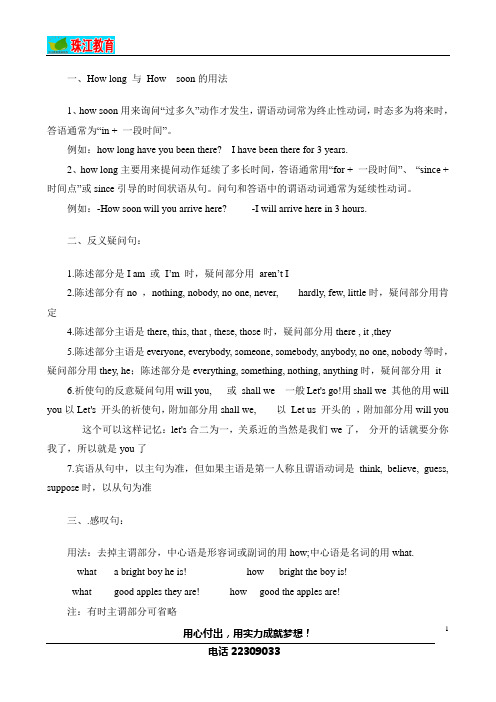
用心付出,用实力成就梦想!电话223090331一、How long 与How soon的用法1、how soon用来询问“过多久”动作才发生,谓语动词常为终止性动词,时态多为将来时,答语通常为“in + 一段时间”。
例如:how long have you been there? I have been there for 3 years.2、how long主要用来提问动作延续了多长时间,答语通常用“for + 一段时间”、“since + 时间点”或since引导的时间状语从句。
问句和答语中的谓语动词通常为延续性动词。
例如:-How soon will you arrive here? -I will arrive here in 3 hours.二、反义疑问句:1.陈述部分是I am 或I’m 时,疑问部分用aren’t I2.陈述部分有no ,nothing, nobody, no one, never, hardly, few, little时,疑问部分用肯定4.陈述部分主语是there, this, that , these, those时,疑问部分用there , it ,they5.陈述部分主语是everyone, everybody, someone, somebody, anybody, no one, nobody等时,疑问部分用they, he;陈述部分是everything, something, nothing, anything时,疑问部分用it6.祈使句的反意疑问句用will you, 或shall we 一般Let's go!用shall we 其他的用will you以Let's 开头的祈使句,附加部分用shall we, 以Let us 开头的,附加部分用will you 这个可以这样记忆:let's合二为一,关系近的当然是我们we了,分开的话就要分你我了,所以就是you了7.宾语从句中,以主句为准,但如果主语是第一人称且谓语动词是think, believe, guess, suppose时,以从句为准三、.感叹句:用法:去掉主谓部分,中心语是形容词或副词的用how;中心语是名词的用what.__what___ a bright boy he is! ___how __ bright the boy is!_what____ good apples they are! ___how__ good the apples are!注:有时主谓部分可省略注:若句中无形容词、副词,只有一个主谓部分,则感叹词用:例如:___how___I want to be a great teacher!___how ___ time flies!7. We have a good time.How good a time we haveWhat a good time we have语法复习感叹句表示说话人强烈的语气,其构成有以下几种:1、What +a/an +形容词+名词+主谓结构肯定句!eg: What a good boy he is!2、What +形容词+名词+主谓结构肯定句!eg: What good news it is !(在口语中经常省略主谓结构肯定句)3、How +主谓结构肯定句!eg: How I miss you !4、How+形容词/副词+主谓结构肯定句!eg: How lovely the boy is!5、How + 形容词+a/an +名词+主谓结构肯定句!eg: How fine a voice he has!句子的结构:说明: 此结构由“主语+及物的谓语动词+宾语+宾语补足语”构成。
- 1、下载文档前请自行甄别文档内容的完整性,平台不提供额外的编辑、内容补充、找答案等附加服务。
- 2、"仅部分预览"的文档,不可在线预览部分如存在完整性等问题,可反馈申请退款(可完整预览的文档不适用该条件!)。
- 3、如文档侵犯您的权益,请联系客服反馈,我们会尽快为您处理(人工客服工作时间:9:00-18:30)。
中考英语重点句法考点:----感叹句和反意疑问句中考英语重点句法考点:感叹句和反意疑问句一、结构:What/ How +被感叹的部分+ 主语+ 谓语!What beautiful flowers they are !二、变法:一断,二加,三调位。
一断表示在谓语动词的后面断开,二加表示在断开的两部分中间加what 或how ,三调位表示前后两部分对调位置。
They had a good time yesterday .一断:They had / a good time yesterday .二加:They had(what)a good time yesterday .三调位:What a good time they had yesterday.三、what引导的感叹句:1.what + a / an +adj + 单数名词(+主语+ 谓语)!_______ a clever boy he is !2.what + adj + 复数名词(+主语+ 谓语)!_______ heavy boxes they are !3.what + adj + 不可数名词(+主语+ 谓语)!_______ bad weather !四、how引导的感叹句:1.How + adj / adv + 主语+ 谓语!_________ hard they are working !2.How + adj + a / an + 单数名词(+主语+ 谓语)!How tall a boy he is !3.How + adj / adv + the + 名词+ 谓语!________ heavily the rain is falling!五、what 与how引导的感叹句之间的转换:1.What a beautiful girl she is !=______ beautiful the girl is !2.How delicious the food is !=______ delicious food it is !六、几个常见的感叹句:1.______ great fun it is !2.______ important information !3.______ good news !4.______ good advice / music !5.______ a heavy rain !6.______a strong wind !七、感叹句中常见的不可数名词:food , work , weather , fun , music , information , news , advice2010中考英语重点句法考点:反意疑问句一、结构:陈述句+ 附加疑问句?It's hot today ,isn't it ?二、原则:1.前肯后否,前否后肯2.前名后代3.时态一致三、变法:一疑、二否、三连、四省、五转换(名变代)。
四、特殊的附加疑问句:1.I'm …… , aren't I ?I'm right , ______ ______ ?2.There be …… , ______ there ?There will be fewer buses in the future ,____ ______?3.句中有反义词的句子的反意疑问句,仍把它作为肯定形式。
He is unhappy , _____ ______ ?4.Let's 的反意疑问句为shall we ?Let's go to the movie together ,_____ _____ ?5.祈使句的反意疑问句为will you ?Don't miss it ,_____ _____ ?6.若陈述句部分含有never , few , little , hardly ,no ,se ldom ,nobody ,nothing …否定词、半否定词时,附加疑问句用肯定形式。
He can hardly understand it , _____ ______ ?7.陈述句的主语为不定代词时:1).主语为指人的不定代词时,附加疑问句的主语用he / they .No one was hurt , ______ _______ ?2).主语为指物的不定代词时,附加疑问句的主语用it.Nothing is serious , _______ _______ ?8.表推测的情态动词的附加疑问句,其附加疑问句与情态动词后的动词一致。
He must be at school , ______ ______ ?9.陈述句的主语是this , that , these , those 时,附加疑问句的主语分别为it , they .This is a new computer , ______ ______ ?Those aren't banana tees , ______ _______ ?10.当陈述句是主从复合句时,其附加疑问句应与主句保持一致。
若主句为I think / believe /suppose /imagine /expect 时,其附加疑问句应与从句保持一致。
He said that he would leave here tomorrow , _______ _______ ?I don't think you can do these exercises alone , _______ _______ ?11.陈述句中有has / have / had 时,一定要注意。
1).若句中是has to / have to / had to ,表"不得不" 附加疑问句的谓语用doesn't / don't / didn't 进行反问.They had to leave early , ______ ______ ?2).若句中是has / have / had 表"有",其附加疑问句的谓语用do/ does / did 进行反问。
He has few friends in the new school, ______ ______?3).若句中是has/ have / had +过去分词时,其反义疑问句的谓语用has/have/had进行反问。
He has never been to Beijing , _____ _____?She had studied a few English songs by the end of last month. ,______ ______?五、反义疑问句的回答:反义疑问句的回答要根据事实作答,若事实是肯定的,就用yes , +肯定形式。
若事实是否定的,就用No, +否定形式。
注意:在前否后肯的句子中,yes表示"不"而No表示"是的"。
She didn't come to school yesterday, did she ?_________, though she was not feeling well.A. No, she didn'tB. No , she didC. Yes , she didn'tD. Yes , she did反意疑问句练习题1、The poor man needs our help, ______ he?A. needB. needn’tC. doesD. doesn’t2、He’s never watched such an important watch, ______?A. hasn’t heB. has heC. isn’t heD. is he3、You have few friends, ______?A. haven’t youB. have youC. you haveD. you haven’t4、Tom has supper at school, ______?A. hasn’t heB. has heC. doesn’tD. does he5、He’s almost finished ______ the book, ______ he?A. reading, isn’tB. to read, isn’tC. reading, hasn’tD. to read, hasn’t6、You were on the farm yesterday, ______ you?A. didn’tB. don’tC. can’tD. weren’t7、Don’t close the window, ______ you?A. didB. willC. wasD. won’t8、Let’s go shopping, ______ we?A. shallB. willC. wasD. is9、Joan’s late for school,______?A. wasn’t sheB. hasn’t sheC. isn’t sheD. doesn’t she10、The meeting will begin at half past two in the afternoon, ______.A. does itB. doesn’t itC. will itD. won’t it11、The sick man’s allowed t o take a walk in the garden every day, ______?A. is heB. isn’t heC. has heD. hasn’t he12、There are few people on the playground, ______?A. are thereB. are theyC. has heD. hasn’t he13、Tom could hardly work out the maths problem, ______ he?A. couldn’tB. couldC. didn’tD. did14、Let’s go to the island, ______?A. won’t youB. will youC. shall weD. will we15、Don’t forget to give Polly some food and change he water, ______?A. will yo uB. shall weC. won’t youD. do you16、There are few people on that village, ______ there?A. didB. doesC. wasD. are17、She is too young to go to school, ______ she?A. didn’tB. doesC. wasn’tD. is18、John had to join a long queue to get a ticket, ______?A. did heB. didn’t heC. had heD. hadn’t he19、--Your blouse is yellow, isn’t it? --______.A. Yes, it is.B. It's red.C. I'm not sure.D.I don’t know.20、You have met before, ______?A. haven’t youB. have youC. do youD. don’t you21、Allen has never been to Beijing, ______?A. has sheB. hasn’t sheC. has AllenD. hasn’t he1、He has a lot of work to do, ______ ______?2、Uncle Wang forgot to bring your bag, ______ ______?3、There’re more than ten pandas on the hill, ______ ______?4、Tom wants to get his TV set back, ______ ______?5、It’s fine today, ______ ______?6、Lima’s just come back from America, ______ ______?7、Mary bought some shampoo in the supermarket,______ ______?8、Nobody was looking for me, ______ ______?9、He needs our help, ______ ______?10、We must study English hard or we can't be good at it, ______ ______?11、You may use his eraser, ______ ______?12、He didn’t say you were foolish, ______ ______?13、They’ll be on duty next Monday,______ ______?14、Tom didn’t watch TV last night, ______ ______?15、She’s been to Shanghai, ______ ______?16、Open the windows, ______ ______?17、That’s a model plant,______ ______?18、Robert knows little Chinese, ______ ______?19、What an interesting story, ______ ______?20、Your parents must be in the library, ______ ______?21、You don’t think he will come back before school, ______ ______?22、You’d better do it now, ______ ______?23、Everything is ready for the party,______ ______?24、They usually play football after school, ______ ______?25、Mary made few mistakes in the exam, ______ ______?26、He has never seen her before, ______ ______?27、Jack hardly goes to the cinema, ______ ______?28、There’re twenty-one girl students in your class, ______ ______?29、Miss Green is going to work in London, ______ ______?30、There’s going to be a meeting this afternoon,______ ______?31、You had a talk with John just now, ______ ______?32、Lucy had a party last Sunday, ______ ______?33、It’s going to rain this afternoon, ______ ______?34、Mr. Green bought nothing yesterday, ______ ______?35、Let’s sing an English song together, ______ ______?36、Let me try it a second time, ______ ______?感叹句的练习题1_____ a clever boy Tom is!2_____ clever Tom is!3 _____ a beautiful flower it is !4_____beautiful the flower is !5_____ an interesting book it is !6_____ interesting the book is!7_____ sunny weather it is !8_____ sunny the weather is !9 _____hard work it is!10_____ hard the work is!11_____ hard Andy studies!12 _____ well the girls are singsing!13 _____ a clever girl she is!14_____ an interesting story it is!15 _____ good children they are!16_____ beautiful flowers they are!17_____ nice the pictures are!18_____ well she sings!19_____ delicious food it is!20_____ cold it is today!21 _____ heavy snow it is!1. You’d rather watch TV this evening, ______?a. isn’t itb. hadn’t youc. wouldn’t youd. won’t you2. I suppose you’re not going today, ______?a. are youb. do youc. don’t youd. aren’t you3. I wish to shake hands with you, ______?a. shallb. may Ic. do Id. will I4. Three hours ought to be enough time, ______?a. oughtn’t three hoursb. didn’t theyc. shouldn’t itd. shouldn’t three hours5. They have to study a lot, ______?a. don’t theyb. haven’t theyc. did theyd. hadn’t they6. When the car crashed, your brother escaped being hurt, ______ ?a. didn’t heb. did hec. did itd. didn’t it7. I'm sure dirty, ______?a. am Ib. isn’t Ic. aren’t Id. am not I8. You seem to be dissatisfied with your present post. I don’t think you judged your ability objectively when you applied for it, ______ you?a. dob. didc. don’td. didn’t9. That’s the sort of the b ook you want, ______?a. is itd. isn’t thatc. is thatd. isn’t it10.All these dictionaries are a great help to you, ______?a. are theyb. aren’t theyc. are all these dictionariesd. aren’t all these dictionaries11.The movie that we saw last week was quite interesting, ______?a. wasn’t itb. was itc. didn’t wed. weren’t we12.Tom has been writing letters all afternoon, but he should have finished them by now, ______?a. hasn’t heb. has hec. shouldn’t hed. didn’t you13.David told me that you would take a trip to America, ______?a. would youb. wouldn’t youc. did youd. didn’t you14.There appeared to be no better way, _______?a. was thereb. were therec. did thered. didn’t there15.You has some trouble finding where I live, ______?a. didn’t youb. hadn’t youc. do Id. don’t I16.He has his hair cut every month, ______?a. has heb. hasn’t hec. does hed. doesn’t he17.Your friend needs to come earlier, ______?a. does heb. doesn’t hec. need hed. needn’t he18.The little boy dare not go to church, ______?a. dare heb. daren’t hec. does hed. doesn’t he19.Susan’d have worked abroad if she’d had the chance, ______?a. has sheb. hadn’t shec. would shed. wouldn’t she20.Everyone’s having a good time, ______?a. is heb. isn’t everyonec. does hed. aren’t they21.Any one can join the club, ______?a. can any oneb. can’t any onec. can’t theyd. can they22.Tell me how to operate the electronic computer, ______?a. will youb. shan’t youc. do youd. don’t yo u23.Magaret scarcely comes to visit you on Christmas Day, ______?a. doesn’t sheb. does shec. do youd. don’t you24.Let’s listen to the radio program that the teacher mentioned, ______?a. do web. don’t wec. shall wed. shan’t we25.You think y ou’re funny, ______?a. didn’t youb. are youc. don’t youd. do you26.Janet used to take part in labor in that village, ______?a. used sheb. did shec. didn’t shed. should she27.What beautiful weather, ______?a. is itb. isn’t itc. won’t itd. doesn’t it28.He ought to go to Kwangchow by plane, ______?a. should heb. shouldn’t hec. would hed. wouldn’t he29.We never dared to ask him a question, ______?a. did web. didn’t wec. dared wed. daren’t we30.Nobody will believe how difficult his work has been ______?a. will heb. won’t nobodyc. will theyd. won’t they31.You must have made the mistake, ______?a. mustn’t youb. haven’t youc. didn’t youd. hadn’t you32.Learning how to repair computers takes a long time, ______?a. i sn’t itb. aren’t theyc. doesn’t itd. don’t they33.Jack has coffee with breakfast, ______?a. hasn’t Jackb. hasn’t hec. doesn’t Jackd. doesn’t he34.They must have stayed at hotel last night, ______?a. mustn’t theyb. haven’t theyc. didn’t theyd.hadn’t they35.There isn’t anything wrong with the radio, ______?a. is thereb. is itc. does itd. does there36.You must be hungry, ______?a. must youb. mustn’t youc. are youd. aren’t you37.Let’s do the exercises by ourselves, ______?a. shall web. shan’t wec. will youd. will we38.Her daughter had the carpets and curtains cleaned, ______?a. had sheb. hadn’t shec. didn’t shed. didn’t her daughter39.The teacher had a talk with you, ______?a. has youb. hadn’t shec. did shed. didn’t she40.Something’ll have to be done about the air pollution, ______?a. won’t itb. will itc. has itd. does it反意疑问句练习答案1 C 19 D2 A 20 D3 B 21 C4 C 22 A5 A 23 B6 A 24 C7 C 25 D8 B 26 C9 D 27 B10 B 28 B11 A 29 A12 C 30 C13 B 31 B14 D 32 C15 A 33 D16 D 34 C17 B 35 A18 A 36 D37 A 39 D38 C 40 A三.巩固练习1. It’s a fine day, Let’s go fishing, _____?A. won’t weB. will weC. don’t weD. shall we2. Frank is working late again. This is the first time this week he’s had to study late, ____?A. isn’t heB. hasn’t itC. hasn’t heD. isn’t it3. —Daddy’s forgot to post the letter again, ____?—I’m afraid he ___.A. has; hasB. isn’t; isC. hasn’t; hasD. has; hasn’t4. —Sorry, I’m not feeling well and I don’t think I can finish.—Don’t worry. Let us do it for you, ____?A. will youB. shall weC. shan’t weD. shall you5. I don’t think he could have done such a stupid thing last night, ____?A. do IB. could heC. did heD. has he6. —The ground is wet.—It must have rained last night,____ ?A. hasn’t itB. didn’t itC. mustn’t itD. isn’t it7. —Jenny doesn’t think that Robert is honest, ___?—I’m afraid not.A. is heB. isn’t heC. does sheD. doesn’t she8. —The new windows need washing.—Well, let’s wash them together, ____?A. shall weB. will youC. should weD. would you9. There is little we can do about it, ____?A. is thereB. can’t weC. isn’t thereD. can we10. —The problem wasn’t difficult for him, was it ?______. He should have been given a more difficult one.A. No, it wasB. Yes, it wasC. Yes, it wasn’tD. No, it wasn’t四.答案DDCAC BCAAD反意疑问句练习1. You’d rather watch TV this evening, ______?a. isn’t itb. hadn’t youc. wouldn’t youd. won’t you2. I suppose you’re not going today, ______?a. are youb. do youc. don’t youd. aren’t you3. I wish to shake hands with you, ______?a. shallb. may Ic. do Id. will I4. Three hours ought to be enough time, ______?a. oughtn’t three hoursb. didn’t theyc. shouldn’t itd. shouldn’t three hours5. They have to study a lot, ______?a. don’t theyb. haven’t theyc. did theyd. hadn’t they6. When the car crashed, your brother escaped being hurt, ______ ?a. didn’t heb. did hec. did itd. didn’t it7. I\'m sure dirty, ______?a. am Ib. isn’t Ic. aren’t Id. am not I8. You seem to be dissatisfied with your present post. I don’t think you judged your ability objectively when you applied for it, ______ you?a. dob. didc. don’td. didn’t9. That’s the sort of the book you want, ______?a. is it d. isn’t that c. is that d. isn’t it10.All these dictionaries are a great help to you, ______?a. are theyb. aren’t theyc. are all these dictionariesd. aren’t all these dictionari es11.The movie that we saw last week was quite interesting, ______?a. wasn’t itb. was itc. didn’t wed. weren’t we12.Tom has been writing letters all afternoon, but he should have finished them by now, ______?a. hasn’t heb. has hec. shouldn’t hed. didn’t you13.David told me that you would take a trip to America, ______?a. would youb. wouldn’t youc. did youd. didn’t you14.There appeared to be no better way, _______?a. was thereb. were therec. did thered. didn’t there15.You has some trouble finding where I live, ______?a. didn’t youb. hadn’t youc. do Id. don’t I16.He has his hair cut every month, ______?a. has heb. hasn’t hec. does hed. doesn’t he17.Your friend needs to come earlier, ______?a. does heb. doesn’t hec. need hed. needn’t he18.The little boy dare not go to church, ______?a. dare heb. daren’t hec. does hed. doesn’t he19.Susan’d have worked abroad if she’d had the chance, ______?a. has sheb. hadn’t shec. would shed. wouldn’t she20.Everyon e’s having a good time, ______?a. is heb. isn’t everyonec. does hed. aren’t they21.Any one can join the club, ______?a. can any oneb. can’t any onec. can’t theyd. can they22.Tell me how to operate the electronic computer, ______?a. will youb. shan’t youc. do youd. don’t you23.Magaret scarcely comes to visit you on Christmas Day, ______?a. doesn’t sheb. does shec. do youd. don’t you24.Let’s listen to the radio program that the teacher mentioned, ______?a. do web. don’t wec. shall wed. shan’t we25.You think you’re funny, ______?a. didn’t youb. are youc. don’t youd. do you26.Janet used to take part in labor in that village, ______?a. used sheb. did shec. didn’t shed. should she27.What beautiful weather, ______?a. is itb. isn’t itc. won’t itd. doesn’t it28.He ought to go to Kwangchow by plane, ______?a. should heb. shouldn’t hec. would hed. wouldn’t he29.We never dared to ask him a question, ______?a. did web. didn’t wec. dared wed. daren’t we30.Nobody will believe how difficult his work has been ______?a. will heb. won’t nobodyc. will theyd. won’t they31.You must have made the mistake, ______?a. mustn’t youb. haven’t youc. didn’t youd. hadn’t you32.Learning how to repair computers takes a long time, ______?a. isn’t itb. aren’t theyc. doesn’t itd. don’t they33.Jack has coffee with breakfast, ______?a. hasn’t Jackb. hasn’t hec. doesn’t Jackd. doesn’t he34.They must have stayed at hotel last night, ______?a. mustn’t theyb. haven’t theyc. didn’t theyd. hadn’t they35.There isn’t anything wrong with the radio, ______?a. is thereb. is itc. does itd. does there36.You must be hungry, ______?a. must youb. mustn’t youc. are youd. aren’t you37.Let’s do the exe rcises by ourselves, ______?a. shall web. shan’t wec. will youd. will we38.Her daughter had the carpets and curtains cleaned, ______?a. had sheb. hadn’t shec. didn’t shed. didn’t her daughter39.The teacher had a talk with you, ______?a. has youb. hadn’t shec. did shed. didn’t she40.Something’ll have to be done about the air pollution, ______?a. won’t itb. will itc. has itd. does it1 C 19 D 37 A2 A 20 D 38 C3 B 21 C 39 D4 C 22 A 40 A5 A 23 B 416 A 24 C 427 C 25 D 438 B 26 C 449 D 27 B 4510 B 28 B 4611 A 29 A 4712 C 30 C 4813 B 31 B 4914 D 32 C 5015 A 33 D 5116 D 34 C 5217 B 35 A 5318 A 36 D 54。
